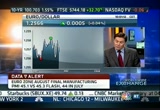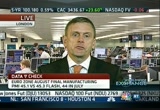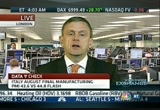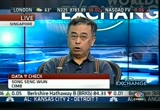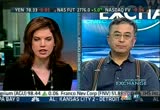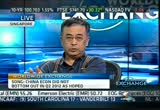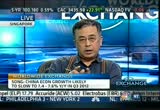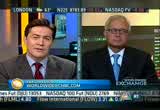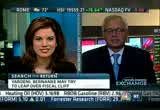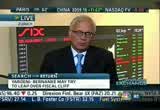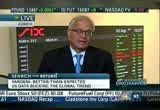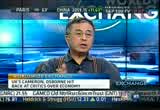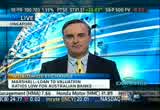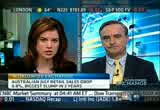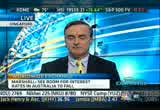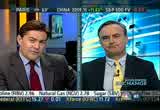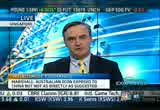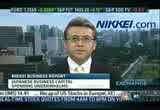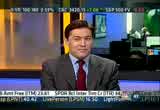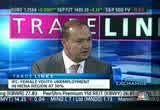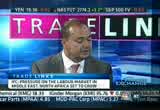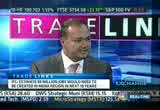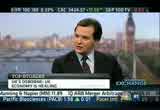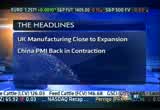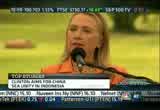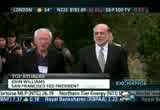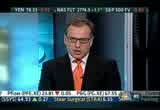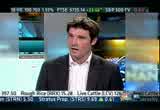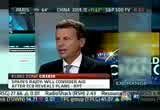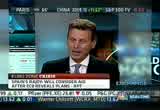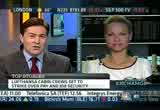tv Worldwide Exchange CNBC September 3, 2012 4:00am-6:00am EDT
4:00 am
hello. welcome to the first "worldwide exchange" of the week. i'm ross westgate. >> and i'm kelly evans. these are your headlines frarnd the world. >> the eurozone in the strongest economies, german manufacturing sector shrinks for the third straight month in a row. >> chinese manufacturing falls in august. >> and spain is executive to announce an emergency rescue before suggesting an injection up to 5 billion euros. plus, the fed leaves markets guessing on further stimulus as all eyes turn to manufactures
4:01 am
and jobs data later this week. welcome to the show. you're back, which i'm thrilled about. >> i'm thrilled about it, too. on a day we have so much data, ross. we have three hours of programming. >> we do. we're going to recap this pmi number for you. the eurozone august final pmi, 45.1, weaker than the flash 45.3 we had a couple of weeks ago. it was 44 in july. the output index, weaker than the flash and the final manufacturing pmi output prices index, 48.6. but all those numbers are slightly firmer, albeit an incredibly low base. so contracting faster than we previously thought.
4:02 am
peter, let's kick off with you. i'm just wondering, as we continue to get this status weaker than we might have thought, just regarding the bigger issue of what the ecb may announce, i'm wondering whether there is any justification for a rate cut. well, i mean, the ecb would argue purely on the economic data on the way to the all-time low, it's unclear whether they're going to make a huge amount of different. it may be a symbolic rate cut. i think there will be a rate cut, anyway. but no, i think in terms of where the economy is, it's going to take a lot more than a few rate cuts here and there. we need an injection of confidence and we need it badly. >> pieter, what do these figures to you suggest that the ecb needs to do? >> well, i think monetary policy is really on a roll, not just in
4:03 am
europe, but in many other parts of the world, too. it really isn't just down to the ecb to do things, it's down to government to start to think about using fiscal policy to see what the eurozone faces. but the ecb in terms of trying to keep the economy afloat, that's the bottom line. i think i'd be thinking about how to expand on conventional policymakers potentially following the fed and the bank of england in terms of a more aggressive bond buying scheme. >> peter, what is it that government -- what more could government do here? >> well, i think there's a -- the problem with government fed is they are adopt ago fiscal straight jacket in many parts of the eurozone. if you impose physical tightening at a time when the economy is already contracting, you make things worse. but i think perhaps a less
4:04 am
aggressive fiscal tightening would be the first priority, even though that's certainly something that the eurozone wants to do. >> how much of the weakness we've seep, we're going to talk generally about the chinese numbers. how much is europe playing into the weakness there? how much of that is a european story? >> a lot i think, really. if you look at the numbers that we're seeing out from asia b it's the increased headwind. so far in the second half of this year, that is dampening confidence and has seen a sharp slowdown which is why factory activities are a lot weaker than usual for the stronger half of the year. so maybe because of this poor visibility on other plans that we are not seeing hiring taking place. we are seeing businesses essentially running down on inventory and as a result, activities just slump. coming back to the chinese pmi itself, yes, it must be the
4:05 am
weakest in nine months, but that's the first time ever for the chinese official pmi. we shrink see subsequentially for the month of august as well as september. so this puts into perspective, i think, the lack of clarity and confidence that we are seeing overhanging i think the economy in general here. >> okay. well, as i say, we'll come back on to that number in specific. peter, confidence is sort of key here. what is the minimum the ecb needs to lay out? very mind the governments have a rolling confidence. what is it the governments need to do to lay out to inject some confidence? well, i think certainly the willingness to engage in further action and willingness to go beyond what the bundes bank will be the minimum that markets want. i think some suggestion that the ecb stands ready to buy bonds is what the markets are looking for. i mean, we're not expecting great details on the outlines of
4:06 am
the scheme just yet, but i think some suggestion hints that the ecb stands in to do that. >> peter, thanks for that sprp a good week. as mentioned, in china we're seeing a worse than expected slowdown in august. will i joins us now with the details. >> thanks, kelly. the final pmi reading came in the top lower than the flash figure at a 41-month although. sluggish external demand dropped hsbc's new order subindex to a nine-month low. meanwhile, job cuts and manufacturers weigh down the official reading employment subindex. on the whole, economist res now
4:07 am
looking at a further slowdown in the third quarter, which could indicate for more stimulus. it should support policies for future needs. at this stage, china is unlikely to take aggressive steps in the near term while it restructures the export-led economies. in the meantime, we're closely waiting for the next batch out china out including industrial output and inflation seekers for further clues. back to you in london. >> thanks very much for that. over in india, meanwhile, the country's manufacturers pulled back production in august, growing at its slowest pace so far this year. more live from mumbai. what is the story over there? >> thanks for that. it's definitely still growth which the pmi is still indicating in india.
4:08 am
so there is a slight bit of a deceleration which is coming, but there's nothing really to be alarmed about. it is still indicating that it could be a growth. however, the growth is the weakest we've seen in the past nine months. but there's a lot of macro details we're receiving, so this is compared to the core sector data that came out after rounds of 1.8% for the month of july and that is basically 38% of the data which comes out on september 12th. and that indicates that maybe it could she a weak data that we could expect, as well. and this basically dives into the gdp data which came in at around 5.8% which is where it was weak on the manufacturing services which was the most worrying, in fact. but coming back to the pmi data, however, it came in around 3.28. let's see how that extrapolates into manufacturing. however, currently just about hanging on to the print in terms of ex pangz since it is the lowest we've seen it in the past
4:09 am
nine months. although, we had the official trade deficit data which came in and exports fell 15% vis-a-vis imports which fell around 7 odd%. so that doesn't bode too well. >> lots of soft data there. thanks very much for that. i'd like to get a thought here. when you look at the data coming out of china and india, what kind of policy response do you expect from chinese authorities here? >> not much they can do at this juncture here. we certainly expect the figures to remain soft. i think at the same time there's a bit of worry about the economy as it is. the latest policy move on the fiscal front has at least lifted one sector, the property sector itself, which is why we have
4:10 am
seen the official there. a little nervous acting further, as well. at this point, we're seeing them acting a little bit more targeted in terms of a punch rather than, saying, giving them the western medicine, they're taking the chinese medicine approach in terms of acupuncture with the monetary policy of injecting liquidity via the open market operation through the short-term papers which the repos papers, 7 days, 14 days and now they're testing the markets for 28 days, basically targeting liquidity for a specific period of time rather than a broad base change in the policy which may have spill over effect on the areas that they still want bigger control over the property. >> there's been some suggestion that chinese officials need and would desire a higher inflation rate in order to keep their
4:11 am
state enterprise functioning in their current form, that that is one of the ways they continue to throw off cash. do you think that perhaps investors should keep that in mind when trying to figure out just how aggressive officials might be here? >> well, it depends on the data flow itself. at this point, i think on its own, we are seeing a little bit of pressure now on the inflation front bhanly coming from slight disruption on the food side. you know, the next data point for cpi probably shows a slight uptick mainly because aoc is effective and because of supply disruption on the food chain itself. on the aggregate, perhaps be wary that this might set feet on to overall inflation itself. although at this point, at the wholesale producer price level, now pressure on prices still remain itself. so i think it's still going to be tough for them to come through with some overall comprehensive plan on what to do
4:12 am
with economy itself, given that there are different parts which are pulling in different directions at this juncture. >> and we'll talk a little bit more about the political turnover later on. stay with us. a lot of focus after u.s. markets are out today for the labor day holiday. kelly is working. that's dedication for you. she's flown back to be with us on a long u.s. weekend. here we are, just an hour into trade, european stocks are a little bit firmer, a little less than 82. the ftse 100 up 0.5%. xetra dax up 0.4%. up nearly 3% for the month of august. cac 40 up .6%. the ibex, just down slightly today, up 10% in august. up 24% since mid-july. but now more eyes will be on spain as we get more details on the bank bailout and what the conditions might be for further
4:13 am
assistance to the spanish government. let's show you where we stand with bond yields. it will be kind of key, really. spanish yields keep nudging back towards that 7% mark, 6.84%. 10-year bunch, 103.7. aussie/dollar, 102.55. weak australian sales out. that chinese number is not help the euro. we'll be looking at manufacturing numbers out of the uk in some four minutes or so. that is where we trade right now here in europe. what about all the action over the weekend and this morning?
4:14 am
now more out of singapore. >> most asian markets shrugged off the latest manufacturing numbers from china. those readings could brick more measures from the ecb. gold liners first on future evening hopes for the fed. following premy wen jiabao's comments over affordable housing, gig them the green light for more investment in the securities markets. the hang seng followed suit. property plays and internet giants. the nikkei was the worst performer, turning negative in late trade to end a four-week low. sharps here lost over 6% after its stake sale price.
4:15 am
samsung lost ground after apple added four more patents to its lawsuit. the country's retail sales data fell more than 8% in july, more than expected. lastly, the index is up more than 4%. pack up those beach towels, summer is over. what kind of mood do you expect in september? what do you expect markets to do as we get into the month and what matters more this week, the ecb meeting or the u.s. payroll data? if you want to join the conversation here on "worldwide exchange," get in touch with us. e-mail us, worldwide@cnbc.com, tweet us or reach us directly to respond to that or anything else you've seen on the program this morning. >> don't miss out on that. still to come, rebekah
4:16 am
4:19 am
former news international chief executive rebekah brooks is set to appear in a london court today. becky is standing outside a london court for us with the latest. remind us what the schedule is today. when are you expecting to see rebekah brooks? >> she should arrive any minute just behind me the press is looking out for her. she's appearing at westminster magistrate's court this morning facing specific le three charges of conspireing which is broadened out to really have an impact on all various parts of the news corp. empire. rebekah brooks is the former ceo of news international. this business is the unit of news corp. which looks after the uk newspaper publishers. she's been in the past an
4:20 am
editor, both at news of the world and at the sun. so she spent more than a decade right at the heart of news corp. as such, we should put that into this context. now, the charges could carry a fine or even two years in prison, but there's some way to go before we get to quite that stage. just in terms of what specifically the charges relate to, two things in particular. one is the alleged interception or hacking of voice mails for the murdered school girl, millie dowler and andy gilchrist. rebeckah brooks vehemently denis these charges. she said she's specifically upset about the charges around millie dowler. she says she spent a portion of her career fighting for victims of crimes and this is very much at odds with that. let's think about the biggest
4:21 am
story here. six years ago now, we had what was originally cast as a single rogue reporter at news of the world, the royal editor who has been accused of phone hacking the phones of members of the royal family. that turned into a much broader story when the guardian newspaper later reported allegations that it wasn't just a single rogue reporter, it was, in fact, a cultural endemic within the news of the world. and the ongoing levison inquiry, of course, around the british press in general. this has broughtened out to include relationships between the british press, police officers, allegations of payments made to police officers, bribery of police officers, and also into the very ethics of how the british press were in general.
4:22 am
today, rebekah brooks faces these specific charges. >> it certainly isn't just banker culture under scrutiny this summer. thank you very much for that. >> let's get back to investing the jackson hole meeting. what are your thoughts now? we've heard from mr. better napky on friday. are we now totally dependent on the isms and the employment data? is it a very close call on whether we get more qe? >> i don't know if it's a very close call. fed chairman made it very clear that his number one focus is the labor markets. he etched a grade to describe the unemployment problem. and i don't see that we're going to get any numbers anytime soon
4:23 am
that we're going the to suggest the labor markets getting any better. it's still expanding, but at a rate that ben bernanke thinks is great. not all of us agree .not all of us believe that monitory policy can do very much about it. >> ed, is there extra emphasis because of concern about fiscal deterioration, the well publicized clip, but the cliff we're facing in 2013? >> yes. that's a great question and another debatable point. there's no debate that if congress doesn't get its act together and just leave the current legislation in place, that we're going to go off a fiscal cliff at the beginning of next year. the debate is whether qe3 should be held back until we see whether we need to cushion a fall as a result of the fiscal cliff or whether we should get a
4:24 am
running start here and really try to crank up the economy so that we can jump off with a lot of momentum off that cliff. it's kind of like evel knievel. it goes up and maybe you can get over to the cliff to the other side. but i think what this all demonstrates is it's a real problem here on the fiscal side. monetary policy really can't trip anything here and yet the fed chairman repeats the old man tra that the fed is ready, willing and able to do more where it's not clear that there is much more that can help. >> ed, what do you do as an inesther? they're signaling complacenccom brent crude is up near elevated lerls. transports are lagging the dow which is northerlily a negative thing. what do you do right now? >> right. well, look, the underlying
4:25 am
global economic scenario still looks pretty challenging, right? china certainly has weaker economic indicators coming out. india and brazil have their problems. yet every time you see a headline saying things are not going well in the global economy, the subtext is, yes, but investors are expecting the weak countries to stimulate. i think you have to go with the basic notion of don't fight the fed, don't fight the bankers. they are committed to doing what it takes to offset these forces we're confronting. >> ed, we have to go. we have some data coming out. but thanks for joining us this morning, yardeni research.
4:26 am
og4l at merrill lynch, we understand the importance of your goals. today, our financial advisors lead from a new position of strength. together with bank of america, they have access to more resources than ever before. a steadfast commitment to help you achieve your financial goals in life. that's the power of the right advisor. that's merrill lynch.
4:28 am
4:29 am
next few hours. injections up to 5 billion euros. >> and the fed leaves markets guessing on further stimulus as all eyes turn to jobs and u.s. manufacturing data later this week. >> we have the latest uk manufacturing pmi number jumping a little bit more than we might have thought. 49.5 in august. the reuters poll was 46 versus a downwardly revised 45.2. so the slowdown is worse than we thought. manufacturing orderers, 49.9 in august. it's 41.8 in july. manufacturing employment has actually kept rising slightly in august. input costs have fallen at a much slower rate. this is all according to markets. the sterling reaction to that news against the dollar, the 158.94. so maybe this pmi number will bolster expectations and we'll shy away from stepping up its
4:30 am
stimulus on the plan to buy 50 million pounds of guild by november. let's get some reaction. george, good to see you. >> good morning. >> thanks for joining us. a surprise jump up, really, in manufacturing. still in the contraction territory. it comes as we got eff visits saying manufacturing in years. what's your own sense as an investor of the manufacturing picture for the uk? >> if you look across the comments from the companies, there's about 25 billion in market cap in the engineering sector. they've all been very persistent. had a good start to the year with top line margins improving. but that's a very consistent picture, especially in asia. and so you're seeing some of that data reflecting especially in that downward provision. >> there's been a big focus of sort of doing business in europe to going to new markets like asia. is that also going to bite them
4:31 am
a little bit? >> yeah. i mean, it was a global slowdown in data. one consistent theme i've seen from every engineering business is they all talk about the new market all in the u.s. focusing on opening factories there and attacking that market. >> great from the u.s. point of view, but just to come back to the uk for a second, i wonder if you're in the camp that views some of the data gathering process, you know, how strong is the uk economy really or should we be right, should we pay attention? >> this employment number, it's still ticking up. >> some of the crashes say the uk feels better than the data suggests. i sort of think, you know, there are segments of the economy in the overall private sector is in better health. the balance sheet, the strength of the corporate level to weather the storm. but i think we are lacking a
4:32 am
clear direction from the top, from the government level. there's no doubt that the awful weather we had in the first half of the year you are going to see a normalization. >> you mentioned the government and george osborne yesterday talked about a new business bank being set up in structure finance guarantees, get a house, possibly more infrastructure spent on a noneway. is this still tinkering at the market? >> i think, yes, if you look at what they're saying, there's nothing revolutionary there. every knew houses creates five new jobs, three in the construction and two in the pipeline. before, 95% of the supply base in that house is for the uk. we import the coal, we import the iron ore. equally, infrastructure spend, you feel the benefit this year whether or not the long-term benefits are right for the country. >> i wonder, too, the funding scheme has gotten a lot of the attention. the u.s., policymakers decide
4:33 am
whether they should do something similar. do you think that's an idea or does it fall in a tinkering camp? >> i think it's the opposite. as a whole, companies, consumers aren't willing to take on more debt at the moment. there are areas of blockage within the criticism. but actually, i don't think a government bank is going to provide a goal for that. >> we want to bring you into this conversation here. do you read into the strength of the uk figures this morning as part of a broader story about britain bucking the global slowdown trend here? >> marginally so. the weaker curbly may have helped. we have seen businesses in asia exploring tun for some of the manufacturing that perhaps may be in this stress situation in the euro and particularly in the uk side. so this slight rebound may reflect that interest from asian businesses in the uk activities
4:34 am
themselves. but, again, we are moving into a seasonally stronger half. >> what do you make about that comment from george? a lot of uk businesses now are focusing on the u.s. rather than china because costs of manufacturing in china is going up. >> true, true. this is still going to be the heart of manufacturing in asia. but also, within the region, we have seen businesses looking and going over to europe and to the uk to look for opportunities, as well. looking beyond the short/medium term, there will be still going to be demand in a further down the road. essentially, people are and businesses are positioned for much longer run in items of europe. perhaps seeing some upturn not two or three years down the road, but perhaps five or ten years down the road. >> just finally, george, how are
4:35 am
you investing? you say in your notes, a huge amount of money on the bond markets just on a relative basis marked a much more manufacturing. what are key holdings for you? >> it's a very interesting point. just to pick up on some of the themes here, economic data, it's a very difficult position. what we're trying to exploit is one of those companies in a very good position that can with stand the fall, say you have fantastic back in strong balancing and it's relatively doing well in the sector. where you see, again, you know, the bond markets very comfortable with the debt, the equity yielding significantly more than that, the business producing a billion in free cash flow. finally and crucially delivering your earnings uprates. people have been waiting a long time for the chairman of that business and i think we're seeing a big change. >> how about the dividends? >> as i said, the bond market
4:36 am
will lend those businesses to significantly less than that. >> good for you. thanks so much for joining us. now, as far as european stocks are concerned today, a little firmer as we've started the month of september trade. just up around .5% across the ftse, xetra dax, the ibex down .3 the%. but it's been a standout since mid-july, 24%, i think. >> take a look at the bond curve this morning as we check in on major bond markets there. 10-year bund, 1.34%. looking at spain and italy, we're seeing 6.83% at a level for the former and 5.81, the level for italy there so some pressure. but a mixed picture across the board. >> sterling has taken a bit of a bounce. euro/dollar steady at 1.2569.
4:37 am
remember we hit 1.2568 on friday. dollar lsh yen, 78.31. austy, its weakest day on the chinese day and weak australian sales. we'll get more on aussie now. australia's retail sales down the most in two years in july. consumers cut back on spending. the data added to recent signs and australia's reports are receiving a separate report. and they don't expect the rba to cut rates. but there is a growing consensus for central banks to ease by the end of the year. although an industry report suggests the slowdown in the mining sector might crimp confidence and lead to lower sales in the future. the ongoing debate over the end of australia's mining boom banking sector, joining us today, marshall senior analyst
4:38 am
at asia specific. david, thanks very much indeed for joining us. i supposed we should work out what's going to happen to australian banks, one has to have some thoughts on the retail sector and the housing sector. give us your own thought about the commodities boom. is it over? >> well, not quite yet in the way that people think. i mean, i'm not the economist, but my understanding of what's happening in australia is that, you know, the ups and downs of short-term demand from countries like china won't make an impact in the very near term was been driving australia's economy is the investment going into the mining sector. so, really, it's from 2014, i think, you know, it's a key issue is what happens to australia's economy. and i think the good news there is really the flexibility. as a credit analyst, we're paid to worry and so we worry about, as you said, high home prices, high levels of household debt,
4:39 am
which could cause problems especially if up employment rises. but i think the good news for australia is the flexibility it has because the currency can come down, and it probably will. it's a resource boom phase and that would give a boost to the other sectors of australia's economy, tourism, manufacturing, australia has some flexibility to reduce interest rates a bit further, fiscal position is very strong. so i think those elements of flexibility means that even if the resource boom does fade, there are adjustments that can take place in australia's economy which could ensure that the growth doesn't fall so sharply that it would trigger, you know, quite severe credit quality for the banks. >> i think you guys can jump in, as well. i think australia is fortunate to be a region are the growth is still fairly strong. if you're looking near at home, you've got indonesia, you've got philippines and further up north, obviously, the north asian economies is slower, but firmer, as well. so i think going forward,
4:40 am
probably can feel under pinned. suddenly i think the demand in terms of the investment in those countries suggests that they will probably drive consumption locally as well as australian consumption from just a wealthy point. >> yes. there are things to worry about, but overall, i think we can conclude that we're relatively sanguin. >> curious, do you share that view that despite all the concern we've seen about australia's banks that there are going to be factors to underpin or help the country there absorb any slowdowns? >> well, the government has flexibility and they're in decent shape together and external factors within here, demand from the region i think will be a factor, as well. this is fiscal holiday coming up and so we are seeing some --
4:41 am
family, for instance, taking a short break and australia, as well. so tourists arriving, growth has slowed down somewhat, as well. but, again, if you look beyond this current uncertainty in the next few years, australia sitting here will probably continue to benefit from, a, commodity cycles to some extent as well as the regional demand either way. >> david, what happens, though? there has been a lot of focus on australia on whether the housing sector would be the next to go the way of the u.s. housing sector as to whether households are too heavily indebted. if we don't see a mining boom, what fundamental drivers there would be for continued growth across the country. when you look towards next year or the year after, what makes you so confident that australia will be different, that it won't face the same challenges as, say, the u.s.? >> well, primarily, it's those points that we just outlined.
4:42 am
the flexibility in the economy and the sectors can adjust to compensate for the demand. but i think there are qualitative issues in the banking sector, as well. we worry about them so we looked at these issues. a couple of key points are that australia is particularly different for the u.s. housing prices are very high. they may come off. but the low to valuation ratios on average are around the 50% level. so even if prices fall 20% to 30%, in theory, this won't have a big impact on the banks in terms of immediate losses. in addition to that, the banks do take third party insurance for their riskier loans. so the insurers would be on the hook for the losses as property prices start to go down. so australian banks have taken steps to adjust themselves into the property market and most of their borrowers are far from subprime because of the tax factors in australia are very attractive for higher income
4:43 am
individuals to buy higher investment properties. typically they do. falling house prices would mean that that would become a poor investment and causing people to rethink putting money in austral australia. on the whole, people can probably pay the interest on those loans. in australia, you can't hand the key back to the lenders and walk away. david, he called them oversized banks dependent on external financing. is that a weakness as to how much they need to be funded overseas? particularly when we get currently weakness? >> it's a good point. i think the good news is not so much as they were. one of the lessons from the xrie sis is they did borrow excessively from overseas. but the loan growth has come off to around a 5% kind of level and at the same time, australians are fading more. so at the moment, they are not reliant on buying more money
4:44 am
from overseas. they're lending australia from domestic deposits. so that reliance has changed. they're standing a lot of bonds and they need to refinance them partly in order to mead the basul 3 requirements. they need to build up liquidity, as well. but i would say they're much more vulnerable to that problem crisis than we were before. we've seen australian currency moving around dramatically over the years and yet the banks continue to fund themselves quite well in international markets. briefly join the crisis when virtually all international banks had difficulties. so they'd a pretty good track record in doing that and as i said, their reliance on offshore funding has reduced considerably due to more deposit funding in australia. >> david, thanks for joining us. again, he's senior analyst at asia pacific financials credit site and song.
4:45 am
thank you very much for your time this morning. >> rip up basul 3. >> making the point that as you drill down into some of the detail they're losing sense of the bigger picture. everyone should check out that speech right away. moving on, mixed capital figures out of japan have left economists and investors unimpressed. kitadai-san. >> thanks, kelly. capital spending by japanese companies rose 7.7% in the april/june quarter compared to a year ago. that's more than double the pace of rise in the previous three months and marks the third straight quarter of expansion. investments in equipment and software totaled about 1.78 billion in the second quarter. metal productsmakers boosted capacity while telecom companies
4:46 am
were busy making smartphone investments. economists are not impressed with the numbers. they point out the growth is due to the figures after the earthquake last year. kpex spending wasn't at risk which suggests weakening exports amid europe's debt crisis are taking its toll. back to you, kelly. >> kitadai-san, thank you very much for that. let's take a look at the agenda for tomorrow. australia central bank is expected to announce its policy stigz at about 6:30 p.m. time. secretary quarter current account figures will be announced at 3:30 cet. and hillary clinton will meet with europe's top leaders in beijing. another cab i didn't tellin crew strike is expected tomorrow by lufthansa.
4:47 am
patricia, how long lasting might this strike go and what are analysts saying about the potential impact? >> the impact, it seems that lufthansa is getting more and more use of this strike actions because we've seen already in february 2010 quite a few strikes going on yet again for tomorrow we have another strike being scheduled. but what is important here is we actually do not know loupg, for how many hours, perhaps more than the eight hours last friday, when it's gol going to start and what the outcome is going to be. i did speak with hoouft hans ya today. they're very well prepared without any necessities for you to reschedule your own flight. so this is definitely something that they're putting forward as something for the passengers. last friday, we have about 26,000 passengers stranded.
4:48 am
in terms of costs, no communication from the company yet. however, they do have their savings program well on the way. they're going to continue with that, trying to save 1.5 billion euros until 2014. low-cost areas putting a lot of pressure on lufthansa going forward. >> all right. yes. could have been any number of airlines between london and milan. thans for that, patricia. trade links is coming up next. significant job losses across a number of sectors across africa and the middle east. what can companies do to help reverse the trend? z z
4:51 am
4:52 am
>> it's a challenge, remains a challenge today. they wanted more participation in the growth and they wanted a better life for themselves. if you look at it going forward, i mean, this is one fast-growing region. the young population, it's a lot of -- population is below 29 years old. our estimate is that you need to create over the next ten years 85 million jobs to get international levels of employment. >> which is saying they want to be part of the global economy and share in the wealth that's being generated. what needs to be done? how does the rest of the world come in and share the growth the rest of the world is sharing through trade? what needs to happen? >> obviously, they need investment, i think, and they need investment i think public
4:53 am
sector, but they're also represented by the sector and i think you need the public and the private sector to -- they need better -- they need the improve their infrastructure. at the same time, at the need foreign investment and this is where the foreign trading partners come in. they also they will also need better access to foreign markets. i think they need to create employment, they need to create jobs. >> well, jobs comes on the back of those things that you're talking about. and so the private sector, at least private foreign sector to get involved, what happens? how many investors are going to get involved so they know whether we've got a stable political environment? >> clearly, people look for political stability. and the region is going to a condition period now. you can see countries like egypt, things are stabilized and very much reflected in the market. if you look at the performance
4:54 am
of the different submarkets, it shows that there's more confidence in egypt today and in the region as a result. but at the same time, i think what's -- what foreign investors are looking for and even domestic investors, they need better skilled employees. i think one of the challenges in the region is that you have a lot of people entering the job market. but they don't necessarily have the skills that the employers want. so one of the ways of tackling these issues and improving the -- of the employees and the prospective employees. >> how much education is still public sector dominated? are there opportunities here for private sector? >> i think there are big opportunities for private sectors. private sector in regional education is very small. but i think it's also looking at the curriculum and working with perspective employers to see what it is that they need. what we hear from a lot of young
4:55 am
people in the market, but we also hear from employers is that they don't necessarily have the training and the skills like modern business require. and it's not only they are the skills that they require more theoretical, they need more practical skills, they need to work a lot on their subskills, as well. communication, learning new things, and they need to be able to, in a way, to enter the force and get trained quicker and saying some -- and what it is today. in jordan, you would need an international company and it takes them about 12 months today. >> and so how do you get over that? because for those reasons, i guess, they're saying hang on, i'm not going to invest because of what you just said. >> i think the investor, the potential investors, that's not only international, but domestic
4:56 am
investors, they have to work with the government and they have to work with potential private sector educators. they need to work on quality assurance, so that's -- and i think they also need to do a lot on the job training. >> how optimistic are you that these things that you talk about, which is a big list of things that, you know, have to happen, how optimistic are you that the world community will come together through trade and business investment and actually help out? >> it's a market, it's a big market. the market is a young population and it presents an opportunity. it's a market that is well located geographical close to europe. and that helps the trade. there is interest for investment in this region. there is obviously political stability. you also need some political support for foreign investors and domestic investors. but this is a way for this
4:57 am
region to grow. i think we're optimistic. we're sigh high growth & levels of growth can be even higher. >> demetrius, the private sector arm of the world bank. for more on the series, go to tradelinks.cnbc.com. plenty to check out there. still to come on the program, the global manufacturing slump is giving investors new cause for concern. can the u.s. defy the gloom and doom? we'll preview a busy week, coming up after the break. f!
5:00 am
welcome back to "worldwide exchange." i'm kelly evans. >> and i'm ross westgate. britain bucks the trend, beating forecasts as the manufacturing sector edges closer to expansion. >> production falls in august. >> and spain set to announce an emergency capital rescue for banks here in the next few hours. reports suggest up to 5 billion euros. and the fed leaves markets guessing on further stimulus as all eyes turn to u.s. jobs and
5:01 am
manufacturing data later this week. okay. so no u.s. trade today. it is a labor day holiday, and we're especially grateful, i am, indeed, for kelly to come here. we have an extra hour of programming for "worldwide exchange." here we are two hours into the trading day, slim gains for european stocks. nearly .5% for the month of august. this is the first day of trading in september. just to remind myself, i know you all know. xetra dax is up .25%. it was up nearly .3%. the ibex down .25%. it was up 10% for august. spanish bonds, still something of a concern as we make our way towards the ecb on thursday.
5:02 am
spanish yields higher at 6.85%. as far as the currency markets are concerned, euro/dollar. 1.2567. today, we won't get a huge amount of volume in the afternoon because there will be no incentive from the united states. euro/sterling, down a little bit. after that manufacturing pmi number came much better than expected. so interestingly enough, employment stilg still picking up in manufacturing. although it's still in contractionary territory. if you like pmi, you'll like china for the last couple of days. >> i think, ross, asian bourses mostly finished higher despite down beat manufacturing numbers from china. analysts say those weak readings could prompt supported policies from the central bank. the gape, 0.6% gold liner search
5:03 am
off future fed. developers rally following the comments on building more affordable housing. the hang seng followed suit, helped by congress congress property place and internet giants. turning negative in late trade to end at a four-week low. lost over 6% after it proposed to revise down its stake back in march. energy places and industrials sent the kospi higher by .4%. samsung electronics lost a round after apple targeted four more cents on products. the afx 200 eked out modest gains, higher by .3%, helped by banks and resources. australia retail sales data fell 0.8% in july, more than expected. lastly, sensex downly .2% at the
5:04 am
moment. that's all from me. back to you. >> thanks for that. now, for those of you watching, you're back this week. >> i'm back. >> let's share how it feels about me being back. >> the chair is very happy because the chair has a voice. >> you guys had a good thing going. there was great banter, you and the chair. >> what i thought was interesting is you were in the states in jackson hole, you're here for the ecb. are you going to go back to the fed for the week? >> no. i was in the u.s. for our bank holiday and now i'm here for the u.s. labor day holiday. so i think there was some cr planning on our producer's part to make sure -- >> you're in the u.s. for the bank holiday and now you're here for the u.s. holiday. >> it was fun to be there in the middle of it. it was not fun to be back in the middle of the political campaign
5:05 am
ads. i will tell you, by the end of the weekend, this inunaddition of campaign ads was driving me insane. i sympathize with everyone over there. >> plenty of room. and you were there for a week. >> yeah. talking about politics, the prime minister mayor anna ravoy says he will wait until the ecb meeting before requesting further aid. he added madrid is comply, conditions and sees no need for more aus trailty. this as spanish bank rescue funds are reported to approve shortly a captain injection up to 5 billion euros for the troubled lender bank here. according to media reports. secretary general guria says both of the region's rescue funds, esf and esm could not be
5:06 am
enacted enough and that the central bank should work to bring down peripheral yield. meanwhile, the german finance manager says this cannot replace economic reforms banking the bundes bank president. >> yeah. the finance minister, as well, george osborne has promised to boost the economy by examining planning rules that he says hinder development. he told the bbc that britain should aim to promote building projects that could help growth. the uk economy has estimated by 0.3%. but osbourn said he remains confidence of recovery. >> different times for the british economy, different times for the world economy. but it is taking time. there no easy route to a magical recovery. we've got to do the hard work of paying off our debt, becoming a more competitive country, making
5:07 am
sure that in the 21st century actually britain has its place in the world. >> on a sunday morning andrew marsh show. meanwhile, france stepped in to rescue its latest lender. stephane has more details. how bad -- clearly, things have got bad. how much do they have to put in? where does the money come from? >> yeah. we knew the situation was difficult, especially since moody's last week downgraded the bank by three movps. the bank is not a regular bank. it doesn't have any deposits from clients, therefore, its only financing itself from the markets. since it's been downgraded last week, the situation was more tense. the government, reporting a source close to the rescue is going to underwrite nearly $5 million from immediate funning. the state guarantee would riech around 20 million euros to stop
5:08 am
making new loans, which is suggesting that the french government sew going to scale down the operations from france and perhaps will not even look for -- the bank has been looking for potential buyers for weeks, but wasn't able to secure a deal including with the negotiations collapse after a couple of weeks. the eif credit is a mock gauge lender with around 33 billion euros in assets. the bank will have to refinance 1.75 billion euros in copper bonds, which will expire shortly in the beginning of october. that's the widest the state guarantee was urgent for the bank. it now needs to be approved by the french parliament. >> stephane, thanks very much for that. back up the beach towels. the summer is over. september is particularly the
5:09 am
top market from the stock market. what matters more this week, the ecb meeting or the u.s. payrolls data? what would it take to get the u.s. into the positive? join us on the show via e-mail, twitter or facebook. >> don't miss out on that. there's nearly two months to go until the presidential election. we'll discuss that as we preview the democratic national convention. plenty of more to come on today's "worldwide exchange." [ male announcer ] it's a golden opportunity to experience the ultimate expression of power... control. [ engine revs ] during the golden opportunity sales event, get great values on some of our newest models. this is the pursuit of perfection.
5:10 am
a passionate belief, and the foundation on which merrill lynch has been built. today, our financial advisors lead from a new position of strength. together with bank of america, they have access to more resources than ever before. a steadfast commitment to help you achieve your financial goals in life. that's the power of the right advisor. that's merrill lynch.
5:12 am
the uk manufacturing sector impresses markets, edging a bit closer to expansion. china has fallen back into contracton for the first time. spain is set to announce an emergency capital rescue for bankia in the next few hours. >> and as we've seen, manufacturing data is showing weakness both in the eurozone and china. li has the details on the figures out of china, and importantly helping us understand the difference between what the official sector and the hsbc index is saying.
5:13 am
>> yeah. thanks, kelly. the hsbc august final reading came in a tad lower than the flat figure. this echos another disappointment in the official number released over the weekend which fell into sluggish territory. job kits weighed on the manufacturer's index. there was hope for domestic men, but on the whole, economists are looking at a further slowdown in the third quarter, which could underscore the case for more e cumulus. china is unlikely to take aggressive steps in the near term while it restructures the export led economy and goes through its once in a decade
5:14 am
leadership transition. in the meantime, we're waiting for the next battle of data out from china. u.s. secretary of state hillary clinton is in understand near ya to helping brings nations toes to help solve territorial disputes in the south sea. she says she'll be looking for ways the u.s. can be supportive before she heads to beijing on tuesday. washington wants a united grooug group of countries to help negotiate it. china, on the other hand, prefers to deal with each country individually. former news of rebekah brooks is in court. what happened this morning, beccy? >> well, rebekah brooks has just
5:15 am
left. she left a moment ago, jumped into her black car and has reparted. she appeared in court behind me for just a few moments to confirm her details and to have the charges read to her. she faces three counts of conspiracy to intercept communications. she acknowledged that she understood those charges and will now appear on the 26th of september at southern crown court alongside the other defenders as the same charges and the next state of this develops. rebekah brooks was the former ceo of news international. news international, of course, is the uk newspaper publishing on news corp. as well as being the ceo of that business, she was the editor of "the sun" paper and editor of "news of the world" paper before that. she was the youngest editor ever at the national newspaper. and has been right at the core
5:16 am
of the murdoch em pair for well over a decade. six years ago, it looks like there was one rogue reporter at the news of the world, the world reporter who had been eventually jailed for hacking royal phones. he had a private investigator that was implicated and was jailed at the same time. what started out as a single rogue reporter turned into a much bigger case. it resulted in the collapse of attempts by news corp. to take over bskyb. it led to a full scare public inquiry not just around news corp., but around the whole into the press of ethics and culture and so what started off as a kind of small story around one british newspaper has turned into the wholesale questioning of the role of the murdochs and
5:17 am
in the british public life and the role of the newspapers in this country, as well. >> becky, thanks for that. federal reserve chairman ben bernanke has left the door open to further quantitative easing during a highly anticipated speech in jackson hole, wyoming, on friday. he is to stopped short of providing a timeline, but indicated the central bank was prepared to act if necessary. speaking to steve liesman from jackson hole yesterday, san francisco federal reserve president john williams said the central bank should consider open ended asset purchases. >> personally, i think we should be moving towards what we call an open ended proemp, basically saying instead of here is a certain amount over a certain period of time, that we will be purchasing assets, but allow us to adjust both the rate at which we purchase and the amount which
5:18 am
we purchase based on the economic conditions. the latest poll suggests barack obama and mitt romney are tied ahead of the democratic national convention in charlotte this week. the president will officially be nominated to run for a second term. both men currently stand at 45% backing. obama spent the weekend criticizing romney's economic policies. before we go to break, here is a look back at last week's republican national convention in tampa. >> we're not afraid. we are not afraid. we're taking our country back. >> this man will not fail. >> the president is just throwing away money. and he's pretty experienced at that. >> i wish president obama had succeeded because i want america to succeed. >> can't do that to himself. you're jutely right. >
5:21 am
5:22 am
indicating. let's start, perhaps, with one of the main focuses for investors and that's the yield on the spanish ten year. this morning, we're seeing some relief there. what do you see when you look at that chart? >> the big picture is the problems in the eurozone are not over. it's saying quite clearly that the market -- the authorities have not addressed the problems of the eurozone efficiently and that the market is going to keep on pushing until those problems are addressed. >> are you seeing further increase there? >> well, what's interesting is shly, yes, we're seeing a further increase in yields. over the summer, there was a three-way correction off the high highs as we saw back in june. in addition, that correction stopped dead above the 200 weak moving average and above the retracement level of the move higher in yields 37. >> well over 7%. draghi comes out with initial
5:23 am
comments back when it started going higher. >> whenever it talks about 7% as a psychiatrologically important level, but what is another level to watch for understand occasions as to whether we're seeing renewed pressure or relief? >> 6%. if the problem is going to be fixed, then you need to see ten-year spanish yields move back. until it does, the near term result is that it move higher. as people come back to work, they're going to -- in the top top side. in the near term, we're seeing 7.2%. >> the spapish ten-year is the single best understaindicator. >> yes. good. because i always say that. i want to hear someone else say it, as well. let's talk about gold, then, in that scenario. >> as we're not dealing with it,
5:24 am
as the problem is still there. gold is a safe haven is attractive. last friday, priced in euro terms, gold posted its highest close of the year. so clearly the need for gold is still very, very strong. on the charl, we broke below the ichimoku cloud chart. >> is that the green on this chart? is that the green sort of area? >> the p2, yes. that green line is a definition of trend. now, when you don't have a trend as we haven't had a trend in gold for the last several months, that tends to move into the middle of the range. and what we're seeing now is gold pushing against the top of the cloud, pushing beyond that, beyond $1700 an ounce. there's another $100 to the top side quite easily. seasonally, this is a good time
5:25 am
for gold. >> here on quack europe this morning, after some of the price action on friday, more people talking about how this is going to be the time that pressure medals, gold, silver start to break out. you're saying this chart is consistent with that? >> very much so. there's one more level to break out. a couple of retracement levels. the top of the weekly clout. but once you get beyond 1700, you've got a bit of clear water and there should be some follow through. >> on to aussie, cad. they like the canadian dollar over lots of other things. are they right? >> this technical guy would agree with them, definitely. the patent on this chart is very, very attractive. it's a classic head and shoulders top. we've had three attempts to break higher. in august, you had a reversal month to the down side. so it looks like we're going to check the next line for that
5:26 am
patent. that's just below parity. >> it would suggest relative strength. >> and we need one quick word on sterling/dollar. >> for my structure lol long dollar. >> yes, yes. >> any re-leigh? >> near term, i think you're going to be fine. i think will stay in its range longer term i think you'll be even happier. >> after the manufacturing data, forget about it. >> phil, thanks for that. still to come on "worldwide exchange," the latest on the eurozone efforts to attack the debt crisis. we'll have updates, as well, from rebecca here in london. [ male announcer ] how can power consumption in china,
5:27 am
impact wool exports from new zealand, textile production in spain, and the use of medical technology in the u.s.? at t. rowe price, we understand the connections of a complex, global economy. it's just one reason over 70% of our mutual funds beat their 10-year lipper average. t. rowe price. invest with confidence. request a prospectus or summary prospectus with investment information, risks, fees and expenses to read and consider carefully before investing.
5:29 am
welcome to "worldwide exchange." if you're just tuning in, i'm kelly evans. >> and i'm ross westgate. here prosecute your headlines from around the world. >> the eurozone slowdown continues to hit the strongest economies in the block, but britain buck tess trend beating forecasts as the manufacturing edge closer to production. and china posts its first official pmi contraction since november avenue last year. spain is set to announce an official rescue plan for bankia in the next few hours. and the fed leaves markets
5:30 am
guessing on further stimulus as all eyes turn towards u.s. manufacturing data and pmi later this week. let's take a look now at how european markets are trading. the u.s., of course, closed for the labor day holiday. over here, we're seeing the ftse 100 adding .4% today. below that 7,000 level after giving up gains in recent weeks, 6,987 there. the cac 40, down in spain ahead of that ban can i a request. ibex down 0.4% following strong gains for the spanish bores. taking a look at bond markets, yield is down to 1.332%. remarkable as investors wait for further action there.
5:31 am
the ten-year pressure rises. he's watching the 6/% level. the u.s. is closed. the ten-year gild is at 1.632%. meanwhile, how do you protect your money in these markets? here is what some of the experts have already told us today. >> i think generally, officials would rather stay away from talking down the pound to making the economy more competitive because we do know that it will create innationary problems in due course. so healthy sterling is probably slightly more difficult, but better in terms of dealing with inflationary concerns for later on. >> it's compelling.
5:32 am
and the risks contained, if there are risks around at the moment, the biggest risks are in government bond markets where you stand to lose a lot of money at some stage when interest rates normalize. >> well, you can say with certainty that weir trying to exploit this. two stops i'd pick out for you. you've got fantastic property back in a strong balance sheet. it's relatively doing well. and you see, again, the bond market very comfortable with the debt, the equity yielding significantly more man that. the business producing a billion in free cash a year. finally and crucially delivering your earnings upgrade. people are waiting for a long time to take over the chairman of that business and i think it's going to change. >> okay. number of ideas, i thought it was interesting, the uk and
5:33 am
talking about the key holdings. not exactly. >> not the strongest place in the world whether it's the uk or the u.s. hasn't necessarily done all that well. although he likes the yield there. what's interesting to me is the comments we just heard on gold. the number of people over the weekend since we heard from bernanke at jackson hole, you're starting to see perhaps more interest there. i think silver had a -- you know, it was up 12% in august. >> yeah, we did. we have a big go on silver with mike gurka. >> yep. we'll keep an eye on the pressure tunnel. >> second general says both of the region's rescue funds, the esfs and the esm could not be inabilitied fast enough and the central bank should work in the debt markets to bring down peripheral yields. at the same time, the german
5:34 am
economy minister has told the germon newspaper that bond bag plans cannot replace economic reforms. joining us now on set is ricardo bariberry. ry car ricardo, we have a huge week this week. what do you think people are expecting this time around? and is it as likely as ever that they'll be disappointed? >> well, if you look at what most economies have seen, they're not expecting a target, they're not expecting a quantitative target for intervention. so they're expecting some sort of intervention. now, it's hard to see what investors globally are expecting. but i think there is still an element of skepticism. >> but when you say they're expecting intervention, does that mean we have to see draghi, the ecb on thursday out?
5:35 am
how specific, how clear do they have to be? is it enough to say they're going to -- is it enough to say stay tuned, they're working on it? or is it specific? >> no. i think this time around it has to be specific. and you no different people expect different things. as far as i'm concerned, i think the ecb will safely say they will aim to keep bond yields at sustainable levels. wa does that mean? i think you have to go back to the analysis for eurozone countries. i think the park is 6%. i think yields in the sector between seven and ten years should not be significantly about 6%. you will have esfs intervention at some degree. it can play in that debt part of the curb and the ecb will supplement that. >> that was going to be my question. if there needs to be buying in only the short-term, how do you
5:36 am
get throng end yields down? >> well, the interesting thing is there are suggestions at least that the type of intervention may be in the primary market. so if the efsf bought half of the auction, over the cost of a year or so, that would provide a huge support for spain in its bond auctions and then the ecb would make sure that the front end is broadly consistent with keeping -- >> well, how urgent is this? because when you look at the capital outflow in spanish banks, now evidence, as well, that suggests spanish banks are actually selling out of their holdings and they're no longer net buys of spanish debt. how much time do you think spain has this? >> not much in my opinion. spain is a country with negative international position. it means he has a lot more debt
5:37 am
vis-a-vis the world. so whatever the ecb does must be aimed at encouraging continuing capital. although they've been smaller in the past, of course. >> the spanish prime minister here, there is growing pressure on him to ask for aid before the ecb will do anything. so the standoff between rahoy and the ecb, how significant is that? are we going to have to wait for rajoy to move fist? >> no. i think the ecb must say more or less how they want to proceed and it will be up to the spanish government to decide when is the right time to apply for this support based on what is in the bond market. >> but he doesn't want conditions. is the ecb going to insist that those conditions are in place? and is that even in their place? >> i think politically he's concerned because he has had to accept conditionality on the banking rescue program. but the fact is, the condition
5:38 am
for efsf support are based on the recommendation from the european commission following the program. those recommendations already exist. they are eight points that the uran commission lists back at the end of may. and these are essentially that to do this for spain has recognition confirmed. so spain simply has to follow those recommendations which are not easy. >> are those recommendations enough to satisfy the fins and the dutch? you have recommendations that are easy enough for spain to swallow, but stiff enough for the others to feel they're getting something in return. >> well, i presume even the political wins in northern europe, those countries will be asking for more. so, you know, there is a technical opinion expressed by the commission and by the council of finance ministers, but then heads of state will have to go ahead to this program. so they made demand a bit more.
5:39 am
>> it does make you want to sigh, doesn't it? it's tough. other stories we're watching today, manufacturing sector slowed to a worse than expected rate as global downturn took the wind out of consumption. hsbc's private survey showed they dropped to a nine-month low. indonesia bucked the trend. southeast asia's biggest economy logged its biggest output in china thanks to strong domestic demand. state media says li johnchu has been appointed to run the day-to-day affairs. still to come on the program, september kicks off a busy month for eurozone debt meetings. can leaders finally put the debt crisis behind them?
5:40 am
5:41 am
in communities across the country. whether it's supporting a delaware nonprofit that's providing training and employment opportunities, investing in the revitalization of a neighborhood in the bronx, or providing the financing to help a beloved san diego bakery expand, what's important to communities across the country is important to us. and we're proud to work with all of those who are creating a stronger future
5:42 am
5:43 am
ecb meeting, the u.s. payroll data, what's happening in china? brian tweeted in to say, i don't think the u.s. employment picture will change much this month. that's been the case recently. mark, meantime, says i'm going against the trend. september will be a good month for markets to rally. you want to join the conversation here, get in touch with us by e-mail, worldwide@cnbc.com or tweet us. reach us directly, @ross westgate or kelly evans. still to come, george osborne has promised to boost the economy by examining planning rules that hinder development. the british economy is estimated to have shrunk by 0.3% this year. but osbourn says he's confident of recovery.
5:44 am
>> a difficult time for the british economy, difficult time for the world economy. but our economy is healing. jobs are being created. it is taking time, but there is no easy route to a magical recovery. we've got to do the hard work of paying off our debt but becoming a more competitive country, making sure that in the 21st century, actually, britain has its place in the world. british manufacturing sector edges closer to expansion. >> but china's activity falls back into contraction for the first time since november of last year. >> and spain is set to announce an emergency capital rescue for the bank here in the next few hours. speaking of bankia, spain's rescue fund is expected to approval shortly a capital injection of up to $5 billion euros. according to media reports,
5:45 am
bankia will receive the funds by september 4th. spanish prime minister mariana rajoy says he will wait for the meeting this thursday before making a decision on requesting further aid. he added madrid is complying with conditions and sees no need more nor aus trarty. >> let's remind you of the timeline here and what's going to be happening on the 4th. thursday, the ecb meeting as well as angela merkel's meetings, span yib prime minister rajoy, and a bond auction, as well. on the 12th, the european commission has a banking proposal. the big deal will be the court reeling on the esm. and then on the 14th, the euro group meets in cypress. now, let's supposing that the constitutional court goes well
5:46 am
and the ecb lays out a plan, will that be the meeting in which spain says, we're now ready, can we agree on the continuelty of any bailout? that might be the way it works. and then on the 22nd of the month, germany's angela merkel meets fran's francois ohlaholla. what do you think, in september, will it all be in play? will we have a plan functioning that will get yields at below 6%? >> we may have a plan to get yields to around 6%. but i don't think we'll have the grand plan or the eurozone. >> that's an entirely different thing, right? >> entirely different thing. i think the purpose here is just to buy some time to see what can be achieved in a more practical fashion. in terms of reforming the eurozone, in terms of having a turn around in the weakest economies.
5:47 am
and it looks like from the latest economic indicators, we are not there yet at all. >> that's the point, actually. the cap yield and getting some growth into spain and italy that improves the debt profile and the debt picture. yeah. here, i think the idea is if yields stabilize, these people are no longer worried about the payment in the government debt and the failure of the banking system, then they will stop the growing money from the bank, things go back to normality. banks can lend some money to the economy. slowly, that improves conditions. at least the economy stops contracting. >> i just wonder, too, how much damage has been done. because if you were to go back two, three years, even, andut into place some of these reforms that have taken this long into the crisis to implement, you know, you wouldn't have greece with a 20 some percent unemployment rate or maybe spain and as these economies within the eurozone become increasingly
5:48 am
divergent, how much more of a challenge is that for policymakers going forward >> of course it makes it more difficult. there are huge interventions. but there is another side to the story. every attempt is made to turn these economies into subecono subeconomies. >> wouldn't he be better to get rid of that by growing, say, exports instead of killing the economy and -- >> absolutely, absolutely. the thing is, what is the external environment? the external environment is what the brazilians call the currency world. every major block trying to weaken that. >> not to mention a little country called germany. >> yeah. i estimate that this year the current count surface in germany will reach 6% gdp.
5:49 am
i think the netherlands will be 10% of gdp. so the strongest countries in the eurozone are getting stronger at the moment. so the other countries, while they're not getting any help from the other eurozone countries, the eurozone has a whole must be that yeah. >> can they do it again this week? >> exactly. so my call is that this week they don't capitalize simply because they need to pause for a moment, assess what's going on in items of inflation, in items of money supply growth. then if the business surveys for september weak once again, as is likely, then you will have a
5:50 am
case to cut rates in october. back in july, they were suggesting that they might cut the deposit rates to a negative level. >> right. >> i view that as a very extreme measure. i don't think they will do it in -- >> well, it's three times. >> it's always a possibility. so i think the goal for the ecb should be as long assen flagz is not a major source of confirm, to try to keep the euro flow to 120, perhaps even weaker than that level. >> good to see you there. thanks so much. the chief european economy, we'll take a short break. still to come, we're back in frankfurt. and it looks far from resolved. ♪ ♪ i can do anything ♪ i can do anything today ♪ i can go anywhere
5:51 am
5:53 am
okay. no help from the u.s. today in the absence of the states with the labor day. european stocks are trying to edge higher and we're up about .75% on the cac 40, .5% for the xetra dax. .6% on the ftse 1100 sxp ibex is down about .1%. in germany, lufthansa is preparing for another cabin crew strike tomorrow. that follows friday's demonstration. patricia is in frankfurt. wa sort of financial impact is this trouble going to have? >> it's going to cost millions, i guess. however, no real number is given from lufthansa as to what friday did cost or what tomorrow may cost. they don't know when, where or for how long this strike will happen. the cabin crew did announce that strike. one thing seems to be more likely that it might last longer than the eight hours it did last
5:54 am
last friday. so what does lufthansa do? they're trying to be as prepared as they can. they say they're going to change tickets of anybody wishing to go so without price. what is it all about? it is a great deal that's been going on for the past 15 months not getting anywhere. ufo would like to have an increase of 5% and guaranteed that no temps are being brought in. hoouft hans ya is offering 3.5% for three years, but people will have to work more, as well. so net-net, i guess. it doesn't really mean that, a, the cabin crew will earn more money or, b, that it would cost lufthansa anything. what i thought was anything, though, the way the shares are reacting, at the moment, lufthansa is up 3.4% been so tra
5:55 am
strike threat is not too much on people's minds. the long-term visions for lufthansa is what matters for shareholders. that means they're trying to send about 1.5 billion euros until 2014. they're going to cut jobs. lufthansa has about 17,000 employees. they're going to cut 3,500 worldwide. 2,600 alone in germany, ross. and it seems among the top management, about 300 of the top managers at loouft hans na play also go. >> for now, patricia, for that saying in the seconder. >> iag, which owns british airways in liberia says it has designed a nondisclosier agreement with american airlines. american, which is in administration, is already in talks with us airways group over a potential merger. iag decliebd to comment on how
5:56 am
much of an vice presidentment it would consider taking in usair lines. the rbos shareholders action group is in talks with litigation funds to sue former chief executive fred goodwin, former chairman tom mcgillis and former chief tom cameron. they would investors were miss led in an investigation previously. the former ceo of barclay's is being questioned over parts to qatar. and american politics, the latest polls show barack obama and mitt romney are tied ahead of the democratic and national conventions this week. that's when the president will
5:57 am
202 Views
IN COLLECTIONS
CNBC Television Archive
Television Archive  Television Archive News Search Service
Television Archive News Search Service 
Uploaded by TV Archive on

 Live Music Archive
Live Music Archive Librivox Free Audio
Librivox Free Audio Metropolitan Museum
Metropolitan Museum Cleveland Museum of Art
Cleveland Museum of Art Internet Arcade
Internet Arcade Console Living Room
Console Living Room Books to Borrow
Books to Borrow Open Library
Open Library TV News
TV News Understanding 9/11
Understanding 9/11
